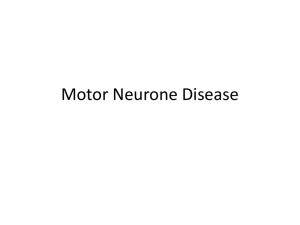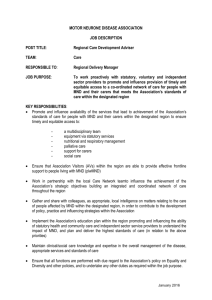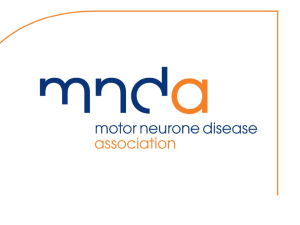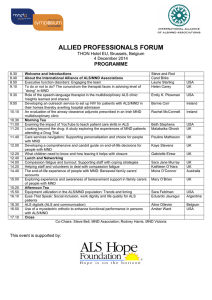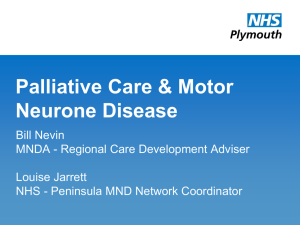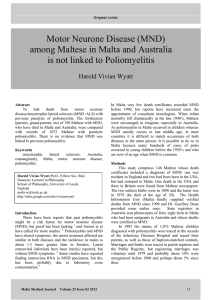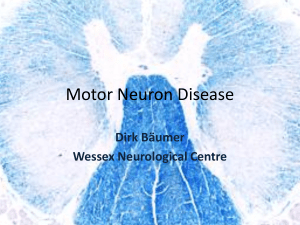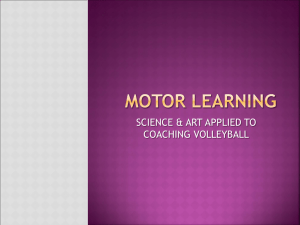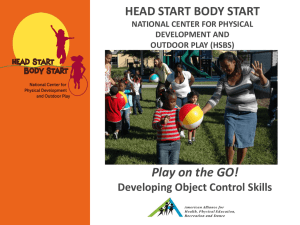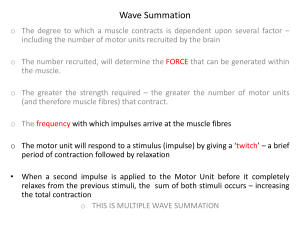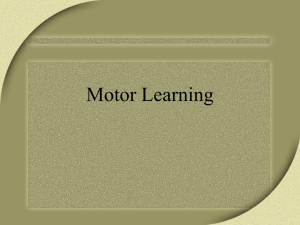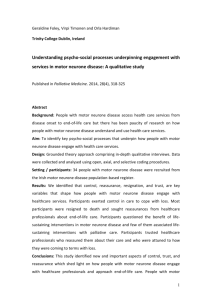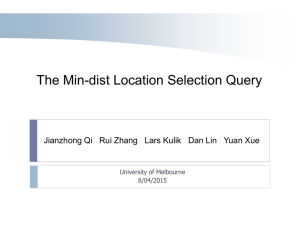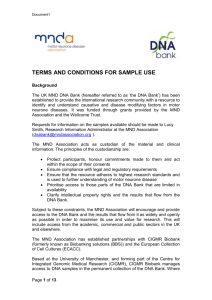MotorNeuroneDisease
advertisement
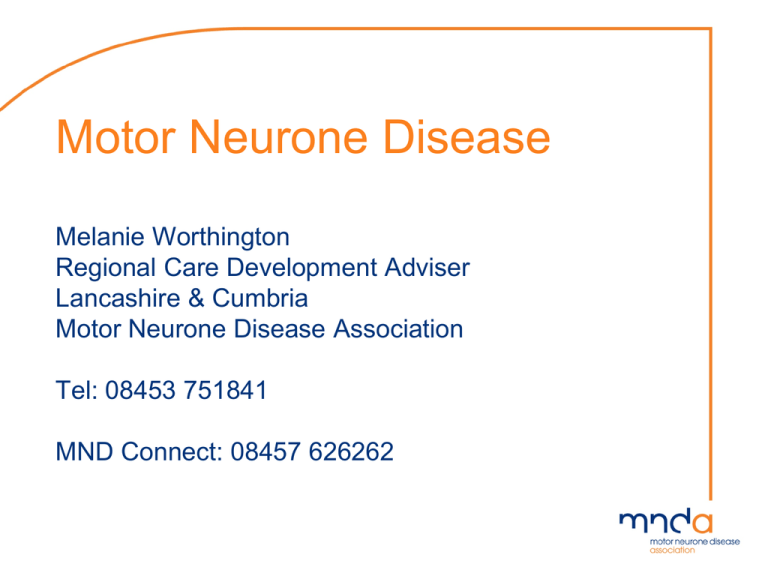
Motor Neurone Disease Melanie Worthington Regional Care Development Adviser Lancashire & Cumbria Motor Neurone Disease Association Tel: 08453 751841 MND Connect: 08457 626262 Neurological Facts • 10 million people in UK have a neurological condition • Account for 20% of acute hospital admissions • Third most common reason for visit to GP • 850,000 carers • 69% of primary care budget is spent on long term conditions (Department of Health) • • MND – over 5,000 people in UK Parkinson’s Disease – 120,000 • Multiple Sclerosis – 100,000 What is Motor Neurone Disease Motor Neurone Disease • • • • • • • • • Every person develops the disease in a different way Symptoms experienced depends on the area of nervous system affected 90% - 95% of people have the sporadic form (out of the blue) 5-10% Familial – 200-300 people Adult Illness – most people are over 50 Average survival 2-5 years from first symptoms. From diagnosis 14 months average. No cure but symptom management and medication that may improve quality or prolong life Onset and progression is variable – can progress swiftly Who does it affect ? • • • • Relatively uncommon Annual incidence of 2 in 100,000 Prevalence 5-7 per 100,000 More common in men but over 65 yrs becomes more even • GPs can expect to see 1 or 2 cases during their career What is Motor Neurone Disease? • • • • Upper motor neurones (UMN) originate in the base of the cortex of the brain : Spasticity Lower motor neurones (LMN) originate in the spinal cord: Wasting/Weakness Act as transmitters that provide a chain of command for voluntary movement to muscles throughout the body In MND this chain of command is broken as neurones degenerate Causes of MND Sporadic – 90% • Risk factors: genetic, environmental and lifestyle factors that may tip the balance: - mechanical/electrical trauma Military service High levels of exercise Agricultural chemicals and heavy metals Evidence is often circumstantial and conflicting Familial – 5-10% •Rare •Research found genetic faults •SOD 1, FUS, VCP and TDP-43 genes •Ubiquilin protein gene •Chromosone 9 Types of Motor Neurone Disease Amyotrophic Lateral Sclerosis (ALS) Progressive Bulbar Palsy (PBP) 20% of cases (onset) •involves UMNs and 65 - 66% of cases (onset) LMNs • dysarthria • involves UMNs and • dysphagia LMNs • emotional lability • muscle weakness – often • progressive • develops in hands and weakness in upper • feet first, spasticity, limbs/neck/ • hyperactive reflexes shoulder girdle Progressive Muscular Atrophy (PMA) 7.5% - 10% of cases Primary Lateral Sclerosis (PLS) 2% of cases • predominantly LMNs affected (may start in small muscles of hand) • muscle wasting, weakness • fasciculation • rare • UMNs only • muscle weakness • stiffness • balance • dysarthria • does not shorten survival (may in time develop UMN involvement and may eventually develop some speech problems) Course of Disease • Onset and progression variable • Is always progressive with no remissions • Usually affects both the upper and lower motor neurones • 90% develop some bulbar symptoms • Death often through respiratory failure Site of Onset • Limb (usually distal) • Bulbar • Respiratory Early Symptoms Depend on area of nervous system affected: • stumbling • foot drop • loss of dexterity • weakened grip • cramps • change of voice quality • slurred speech • early swallowing difficulties • muscle wasting • fatigue Diagnosis of Motor Neurone Disease Diagnosis • On average, it takes 14 months from first symptoms to diagnose MND • First signs and symptoms often subtle and non-specific, similar to other diseases • Person often not referred to a neurologist directly • No definitive diagnostic test How is MND Diagnosed? • Interpretation of clinical symptoms and signs • Investigations to exclude other causes • MRI • Lumbar puncture • Lack of definitive test problematic Effects of Motor Neurone Disease Effects of MND • Progressive muscle weakness and wasting • Loss of weight • Fasciculation, cramp and spasticity • Dysarthria-slurred effortful speech • Saliva and Mucus Problems • Dysphagia - poor swallow due to weakness and paralysis of bulbar muscles • Respiratory muscle weakness • emotional lability • Cognitive changes Clues to respiratory muscle involvement in MND •Breathlessness - on minimal exertion - on lying flat • Poor sleep • Excessive daytime sleepiness • Headaches on awakening • Excessive nocturnal sweating Psychosocial Impact • Multiple losses: physical loss, loss of control, role, independence, self image, self esteem and confidence • • • • • • Financial Home environment Communication difficulties Increasing isolation and dependence on carers Anxiety, Fear, Anger Knowledge of own impending deterioration and death Cognitive changes • MND has been traditionally viewed at a disease affecting the motor system with no compromise of cognitive abilities • Recent research shows that 25% or more show some cognitive changes in the frontal lobe region • 3-5% will have fronto-temporal dementia (FTD) What isn’t affected by MND • Senses: touch, taste, sight, smell and hearing • Bowel and bladder function • Sexual function and sexuality • Eye Muscles • Heart muscles Treatments and Interventions Aims of Management •Control of symptoms • Promote independence and control – usually supported at home as much as possible • Plan appropriate interventions • Enable person with MND and family to live as full a life as possible Treatments/interventions in MND Multidisciplinary approach Palliative care Rehabilitation medicine Sensitive Management Person with MND Pharmaceutical management of symptoms Nutritional support PEG/RIG Respiratory care Disease modifying therapy Life Prolonging Interventions • Riluzole only drug to have beneficial effect on survival : 3-4 months • Respiratory care: Non-invasive ventilation (NIV) • To improve quality of life. • Median survival extended 205 days (Miller et all 2009). Multidisciplinary approach End of Life Decisions • Advanced Care Planning • Advanced decision to refuse treatment (ADART) • Advanced Statment of wishes and preferences • Preferred Priorities of Care (PPC) • Withdrawal of treatments • Tissue donations MND Association Support Provided to plwMND, families, carers and professionals • • • • • • • • • • • Standards of Care Regional Care Development Advisers Association Visitors and Volunteers Equipment Loan Financial Support Care Information MND Connect Local Branch Network Care Centre Programme Education/Training www.mndassociation.org Motor Neurone Disease • Melanie Worthington RCDA Lancashire and Cumbria Tel: 08453 751841 melanie.worthington@mndassociation.org • Preston MND Care & Research Centre Royal Preston Hospital Tel: 01772 522545 • MND Connect: 08457 626262 • mndconnect@mndassociation.org
